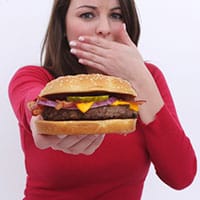Having a food aversion and having anorexia nervosa are two very different problems. Both can be painful. Both can make you dangerously thin. Yet, food aversion is often temporary and usually not life-threatening to the person, while anorexia can last for years and can cause death. It is possible for the two illnesses to overlap, yet experts offer explanations as to how these two illnesses are quite different.
Food Aversion
Oftentimes, when women are pregnant, certain smells or food tastes will make them feel ill. Foods they had loved pre-pregnancy may become their evil enemy during gestation. The food may make them nauseous or the taste may be unpalatable to them. This food aversion can cause the female to reduce her food intake and make her weaker and thinner. When she is carrying a baby, it makes it difficult for her to get enough proper nutrition for the both of them. Having a food aversion is a frustrating illness that strips someone of their choices of what to eat. People want to eat certain foods, but the food makes them ill. Luckily, it is temporary. That pizza that was unpalatable during pregnancy will be appetizing for her again someday.
Anorexia Nervosa
In contrast, those with anorexia choose not to eat. They are more upset with their physical appearance than they are by any food. Anorexia is a psychological eating disorder. An anorexic has a distorted view of their appearance and believes they are overweight even if they look dangerously skinny to others Those with anorexia can become ill because their body is starving for nutrients and proteins. In severe cases, anorexia can cause starvation and death.
Help for Both
People who suffer from either disorder can find help. For people with food aversion, experts offer tips to help them find nutrition from multiple sources. First, if certain smells are making it more difficult to take in food, then they should take a break from the kitchen and let someone else prepare the foods. The mixture of foods in a kitchen can be enough to ruin entire meals. Second, in order to keep receiving proper nutrition, people should think of substitutes for proteins and different vitamins and minerals. Meat and beans could both work for protein, while milk and cheese could either be used for dairy. For people with anorexia, mental health specialists can offer therapy to find out what underlying matters are causing their symptoms. Even though anorexics choose to not eat, it is not a completely uninfluenced choice. Their mind distorts their body image and makes it difficult for them to make good choices for their nutritional health. With guidance and therapy, they, just like those with a food aversion, can also feed upon all the foods they once had enjoyed.

